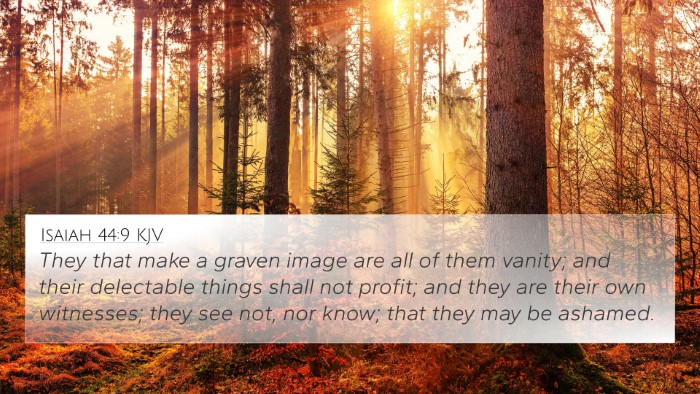Psalms 115:8 - Understanding the Verse
Bible Verse: Psalms 115:8
This verse states: "Those who make them are like them; so is everyone who trusts in them." This is part of a larger context where the psalmist contrasts the living God with the idols of the nations. The psalm specifically critiques those who place their faith in false gods, ultimately revealing the futility of idolatry.
Summary of Meaning
The verse serves as a warning about the dangers of relying on elements that lack true substance or power. The connection between the makers of idols and the idols themselves emphasizes a profound truth about faith and trust: that one becomes like what they worship. Below are insights drawn from public domain commentaries:
-
Matthew Henry:
Henry reflects on the folly of idol worship, noting that those who create idols are blinded by their own delusions. He emphasizes that just as the idol has no life, those who rely on it share in that lifelessness. The contrast between the true God and mere representations is paramount, as Henry asserts that believers must look to the Lord for life and hope.
-
Albert Barnes:
Barnes elaborates on the nature of idols, pointing out that they cannot see, hear, or respond, leading their followers into spiritual blindness. He notes that true worship must be directed toward the living God, as reliance on idols results in spiritual stagnation. This verse can also be connected to a broader understanding of how our beliefs shape our character and actions.
-
Adam Clarke:
Clarke emphasizes the moral and social implications of worshipping idols. According to him, the character of an individual or community is shaped by what they revere. This verse serves as an admonition that faith in false gods results in moral decay and ethical emptiness, encouraging readers to engage deeply with what they worship.
Cross-References
To gain deeper insights into Psalms 115:8, here are several Bible verse cross-references that relate to its themes:
- Psalm 135:18: "Those who make them will be like them; so will all who trust in them." This verse mirrors the sentiment of Psalms 115:8, reinforcing the idea of becoming like that which one worships.
- Isaiah 44:9-20: A critique of the absurdity of making idols and then placing trust in them, highlighting the folly of idolatry.
- Jeremiah 10:14: Similar themes about the craftsman being left with a lifeless object, emphasizing the difference between the living God and inanimate idols.
- 1 Corinthians 10:14: Encouragement to flee from idolatry, linking the concept of physical idols to spiritual fidelity.
- Galatians 4:8-9: Discusses the transition from idolatry to realizing the truth of God, showing how belief shapes identity.
- Romans 1:25: Reflects on the exchange of truth about God for a lie, further connecting the consequences of idolatry.
- Psalm 12:2: Discusses flattery and deceit, which can be analogous to the empty promises of idols.
- Matthew 6:24: "No one can serve two masters," echoing the theme of loyalty and trust placed in God versus false idols.
- Isaiah 42:17: "But those who trust in idols will be turned back in utter shame," warning against the ultimate folly of idolatry.
- Acts 17:29: Discusses the implications of falsely imagining the divine, connecting to the nature of true worship.
Thematic Connections
This verse leads to various thematic Bible verse connections throughout scripture, emphasizing the nature of worship, the character of God, and the consequences of misplaced trust. By analyzing cross-references, one can understand the underlying truth about idolatry, faith, and the human condition:
- Faith vs. Idolatry: Psalms 115:8 warns against the futility of shallow faith and the dangers of replacing the living God with lifeless idols.
- The Sovereignty of God: The contrast between God and idols highlights God's supreme authority and realness against the backdrop of false worship.
- Identity in Worship: The connections emphasize that what we worship shapes our identities and values; faithful worship leads to true life in Christ.
Conclusion
In conclusion, Psalms 115:8 serves as both a warning and a profound truth about the nature of worship. For anyone studying this verse, utilizing tools for Bible cross-referencing can yield deeper insights, tying it to various other scriptures that reinforce its primary themes. By understanding the implications of this verse through comparative Bible verse analysis, one can grasp the significant impact of worship on personal identity and spiritual vitality.







